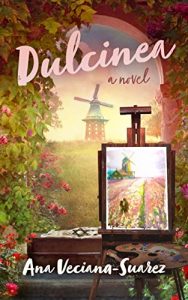Writing Through Grief: Ana Veciana-Suarez
 I was on the fourth draft — or was it the fifth? — of my historical novel, Dulcinea, when my father died. Seven weeks later my daughter, the eldest of my five children, passed away, too. Neither death was unexpected, but recognizing the inevitable didn’t lessen the grief. Nor did it help me deal with the aftermath: the disbelief that lurches into anger before slipping into denial and finally settling into unfathomable sadness.
I was on the fourth draft — or was it the fifth? — of my historical novel, Dulcinea, when my father died. Seven weeks later my daughter, the eldest of my five children, passed away, too. Neither death was unexpected, but recognizing the inevitable didn’t lessen the grief. Nor did it help me deal with the aftermath: the disbelief that lurches into anger before slipping into denial and finally settling into unfathomable sadness.
Yet, during this endless loop of intense emotions, writing and revising Dulcinea served as ballast. In fact, it was the only activity engrossing enough to provide a reprieve, however brief it turned out to be. Every day, minutes after I sat at my desk, I left behind the hard reality of my world, its burden of heartache, and traveled to the long-ago time of Golden Age Spain. Once there, I saw everything through the eyes of my narrator, Dolça Llull Prat. The ancient stone buildings of Barcelona. Its narrow alleyways. The silks and brocades. The galleons docked at the port.
Not that the journey into the early 1600s was easy. Actually, it was just another kind of challenge. For me, writing has always meant ripping my chest open and turning my heart inside out, and this act of self-mutilation is especially true when I’m working on fiction. Putting thoughts and feelings on paper, wrestling with imagination, and examining experiences demands heavy lifting. It requires questioning, reflecting, ruminating. And that’s really, really hard, particularly if you want to make it read easy.
Every writer has heard the old bromide: “There is nothing to writing. All you do is sit down at a typewriter and bleed.” That gem is attributed to Ernest Hemingway, and it accurately describes the nerve-wrecking, back-breaking, carpal tunnel-causing labor that helps stanch sorrow because the act of creating is so blessedly absorbing, so all-encompassing.
I’m no stranger to grief. In fact, I know well the desolation that follows the loss of a beloved. My first husband died of a heart attack at 37. It knocked me off my feet, challenging my faith and, scariest of all, our family’s livelihood. After that, it seemed death was stalking me. In what was a terrible span of pain and punishment, a nephew drowned, my sister and brother-in-law were killed in a car accident, and my mother died of pancreatic cancer. She was younger than I am today, a fact I think about every day. But regardless of age or circumstances each loss felt unfair, undeserved.
Through it all, I wrote. It was what I knew how to do. The only thing I wanted to do. A year after my husband’s death, I had a manuscript and a book contract for my first novel, The Chin Kiss King. Later, when grief visited again, I placed the proverbial butt in the proverbial desk chair and got lost in other book-length projects. The arduous work provided me with a strange sense of comfort. More than that, it gave me control, or at least the semblance of it, at a time when I was surrounded by incomprehensible chaos.
Writing heals, this I know, but I think it heals in different ways for different people. That’s why grief counselors sometimes recommend keeping a grief journal. The act of putting pain into words can initially stir up strong emotions, but it can also double as an escape valve. An acquaintance, who journaled almost daily after the death of her husband, confided that she often got very angry — at him, at her circumstances, at other couples she knew — when she scribbled in her notebook. That feeling, however, would eventually give way to relief. She wrote for herself, about whatever popped into her head, without concern for punctuation or grammar. It didn’t have to make sense as long as she got it out of her system.
Writing a book, of course, is different. A novel needs character arcs, plots and subplots, scene and sentence structure. You hope for an audience and work towards a manuscript that is compulsively readable. Nevertheless, writing a novel can provide the same kind of release as grief journaling even if the story itself doesn’t involve the death of a loved one. While revising Dulcinea with my agent, it occurred to me that, in some ways, the profession of writing has helped me understand, and clarify, the process of grieving.
In grief, as in writing, the journey to the finish line, if there exists such a thing, is long and circuitous. You have good days and you have horrible, awful, very dark days. Either way you must push forward, you must trust movement, even if it’s not linear. It’s true what they say: The only way out is through.
What’s more, both writing and grieving require you to navigate overwhelming negative feelings and a ton-load of second-guessing. Sadness and insecurity are rough undertows. I’ve never experienced grief without a lingering hangover of guilt. I’ve never submitted a piece of writing without questioning my skills. But I’ve learned to sit with the contradiction, knowing it to be fleeting.
I’ve also learned that, whether muddling through a chapter or through the fifth month of unbearable loss, I must mend, sew, and cobble together disparate parts to make an outwardly seamless whole. It’s exhausting, this making and repairing, and I wouldn’t wish such onerous labor on anyone.
In the end, however, both writing and grieving have made me a much more resilient woman, and that’s not such a bad byproduct of all that doubt and pain.
—
Author bio: Ana Veciana-Suarez is a recipient of a CINTAS Fellowship and an Individual Artist Fellowship Award from the state of Florida for fiction writing. A syndicated columnist, her commentary has appeared in O, The Oprah Magazine; Woman’s Day; Reader’s Digest; and various newspapers and websites. She lives in Miami. Visit her website at AnaVecianaSuarez.com.
DULCINEA
 A feminist Shakespeare in Love reimagining of Cervantes, Dulcinea tells the story of Dolça, the fictional muse behind Don Quixote—a must-read for fans of Year of Wonders by Geraldine Brooks and The Book of Longings by Sue Monk Kidd.
A feminist Shakespeare in Love reimagining of Cervantes, Dulcinea tells the story of Dolça, the fictional muse behind Don Quixote—a must-read for fans of Year of Wonders by Geraldine Brooks and The Book of Longings by Sue Monk Kidd.
The daughter of a wealthy merchant, young Dolça Llull Prat is besotted with the dashing, bootstrapping Miguel Cervantes from their first meeting. Despite Miguel’s entreaties, the ever-practical Dolça, with her love of luxury and her devotion to her own art, repeatedly refuses to upend her life for him, although she always welcomes his attentions on her own terms. When Miguel renders her as the lowly Dulcinea in his great Quixote, revealing their association, he commits an unforgivable offense and their decades-long affinity is severed—until he reaches out to her one last time.
The roads of Spain are no place for a noblewoman seeking to reunite with her former lover, but Dolça needs to unburden herself of a secret. Disguised as a peasant and accompanied by her trusted nursemaid, Dolça makes the difficult trek, facing bandits, the menacing reach of the Inquisition, and her own misgivings. Will she arrive in time? And if she does, will she be able to tell Miguel what she has concealed from him for so many years?
Veciana-Suarez’s richly imagined heroine leaps from these pages as a woman of flesh and blood, one committed to both duty and desire. Dulcinea explores the choices we make in life, the regrets we harbor, and the courage we find to make amends.
BUY HERE
Category: On Writing
























